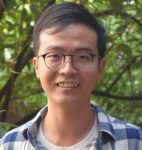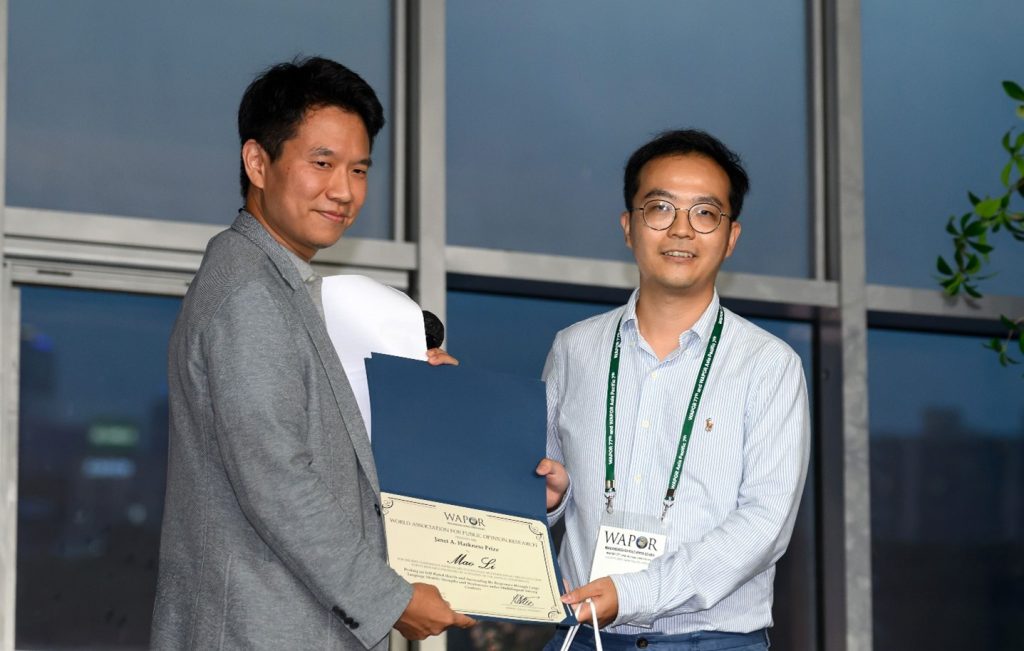September 2024: Spotlight Interview with Mao Li and Stephanie Morales (University of Michigan), two of the recipients of the 2024 Janet A. Harkness Student Paper Award

Congratulations on receiving this year’s Janet Harkness Award!
ML: Thanks to the WAPOR committee for this incredible honor and opportunity. We’re deeply grateful!
SM: Thank you! We are honored to receive the award.
Could you tell us more about your respective backgrounds? What brought you to the University of Michigan, and what do you like about living in Ann Arbor?
ML: I completed my undergraduate studies in political science at Nanjing University and earned my master’s degree here at Michigan. Now, I’m continuing in the same program for my PhD. My main interests lie in quantitative methods and data science—the dynamic, cutting-edge areas of research. The University of Michigan has been the ideal place to refine my skills, and I feel fortunate to continue my studies here. Living in Ann Arbor has been great as well; it’s a quiet, small town that helps me focus on my research. My only small complaint is the occasional rainy weather and lack of sunshine!
SM: The Michigan Program in Survey and Data Science is what brought me to the university. I was drawn to the program because of its emphasis on innovation and the quality of courses. My favorite part about Ann Arbor is the number of green spaces around us and the quality of life.

Could you share more about your academic trajectories and current research interests?
SM: My academic background is in psychology and sociology. I have learned to use my social science background to investigate measurement issues in data collected from racial/ethnic and linguistic minorities. I’m interested in cross-cultural survey research and often work with data collected from multiple countries in multiple languages.
ML: My passion for exploring advanced methodologies and algorithms in social science led me to the Michigan program. It offers remarkable opportunities to learn and apply cutting-edge algorithms through practical experience. I also enrolled in a dual degree program in scientific computing. My research focuses on applying machine learning in survey science and exploring high-performance computing with large-scale data. I’m particularly excited about how AI can enhance the work of survey researchers in various fields.
How did you first become involved in public opinion research?
ML: It all started in my junior year of undergrad, during a project that examined youth values in China. I helped with data collection and analysis, and that experience sparked my interest in public opinion research. It was also my first hands-on experience in survey data analysis, which further fueled my passion for the field.
SM: I first became introduced to public opinion research by working with Dr. Sunghee Lee. She encouraged me to submit my research to the American Association for Public Opinion Research (AAPOR). I now attend and present at AAPOR every year!
Can you tell us how the idea for your award-winning paper emerged?
SM: By simply having a regular discussion! We were talking about a dataset that Kaidar and I were working with, and we discussed this idea with Mao and decided to execute it.
ML: Yes, Kaidar brought up the challenge of coding self-rated health probes in multilingual surveys, and we began brainstorming potential solutions. We then consulted with our supervisor, Dr. Sunghee Lee, who gave us very positive feedback. From there, I decided to investigate whether generative AI, which is so widely discussed these days, could help. Due to data privacy limitations, I conducted a pilot study using several open-source LLMs, and the promising results encouraged us to move forward with the project and ultimately turn it into a paper.
Your paper examines the role of large language models (LLMs) in automating the coding of open-ended survey responses. You’ve demonstrated their effectiveness across various Western languages and emphasized their potential for streamlining survey research. What other opportunities and challenges do you foresee in using LLMs in survey research?
ML: There are plenty of opportunities. I’ve seen excellent projects presented at WAPOR that explore these possibilities. LLMs can be used in many aspects of survey research, from translating survey questions and coding open-ended responses to designing questionnaires, testing questions, and even acting as AI interviewers. However, one key point I’d like to stress is that domain expertise is still essential. We need that knowledge to guide LLMs to perform tasks correctly and in alignment with our expectations. While LLMs hold immense potential for automating processes and improving efficiency, we must remain cautious. For instance, biases in training data can affect response accuracy, and LLMs may face challenges with cultural and linguistic nuances, especially in non-Western contexts. Still, I’m optimistic about LLM’s role in advancing survey methodologies.
What projects are you currently working on?
ML: I’m collaborating with my mentor, Dr. Fred Conrad, on a project that explores the insights we can gain from social media data—what we call “organic data.” We’re applying machine learning algorithms to mine public opinion from social media platforms. It’s an exciting blend of survey science and data science, and it’s been a fantastic learning experience.
SM: I am currently working on multiple projects. Regarding my dissertation, I am focusing on analyzing response trajectories over time and how these patterns differ among racial/ethnic groups, comprehension issues with sexual orientation and gender identity questions with Spanish speakers, and lastly, the interaction between interviewers and respondents during the consent process for additional data collection. I am also working with Dr. Sunghee Lee on a project in which she is working on building a national panel with the aim of improving the inclusivity of Alzheimer’s disease and related dementias research.
How did you first hear about WAPOR?
SM: Through AAPOR and my professors!
ML: I first heard about WAPOR during my first year as a master’s student at Michigan. Since WAPOR is the leading international conference in public opinion research, it’s difficult not to know about it when you’re involved in the field!
Was this your first WAPOR conference? What did you enjoy most?
ML: Yes, this was my first WAPOR conference, and I thoroughly enjoyed it. The organization was excellent, and I really appreciated the chance to network with both peers and senior researchers. The various networking opportunities, like the lunch and coffee breaks, and the awards banquet, made it a truly memorable experience. When I think of Seoul, the WAPOR conference is the first thing that comes to mind!
From an early-career academic’s perspective, what advice would you give to peers on making the most of conference participation? How can they network effectively?
ML: I’d recommend attending the lunches and coffee breaks. WAPOR provides wonderful opportunities to meet and talk with both junior and senior researchers in a relaxed setting. And, of course, the food is great!
SM: I make the most of my conference participation by attending as many sessions and events as I can. As far as networking, if I attend a session and find a paper interesting, I make sure to stick around after it’s over and introduce myself to the presenters and ask them a few questions. At AAPOR, the All-Chapter party is also a great place to network because everyone is a bit more relaxed, especially after a few drinks!
This was actually the first time that a multi-authored paper received the Janet Harkness Student Paper Award. What are your recommendations to other students and early-career researchers for collaboratively writing a multi-authored paper?
ML: My recommendation to other students and early-career researchers is to actively engage in networking opportunities, such as attending conferences like WAPOR. These experiences help you stay informed about others’ work, even outside your area of expertise, and provide a platform to share your own research, which can inspire ideas for applying your knowledge to solve diverse problems. For example, while my research interests focus broadly on the application of novel machine learning algorithms and language models, I had limited knowledge of Self-Rated Health (SRH) probes. The support from my co-authors, Stephanie and Kaidar, and our supervisor, Dr. Sunghee Lee, was invaluable in this area. Additionally, at WAPOR, I encountered many exciting projects that sparked new ideas and possibilities. In today’s multidisciplinary and AI-driven world, it’s rare for one person to master all domain knowledge. Reaching out to peers or senior researchers for brainstorming and collaboration is crucial for developing comprehensive solutions.
SM: In addition, something that was super helpful for us was to acknowledge each other’s strengths and weaknesses. That helped us build a solid paper and be effective in how we worked and spent our time.
Finally, we are interested in hearing from you about ways in which WAPOR can better support students and early-career professionals in public opinion and survey research?
ML: It would be amazing if WAPOR could organize specific networking events that bring students and senior researchers together. Additionally, since WAPOR is a global organization, it would be beneficial to offer information about exchange programs for public opinion research across different regions.
SM: Offering more funding for students would be helpful, especially since we often need to travel abroad to attend WAPOR and the costs can add up.
Thank you very much for taking the time to answer our questions and sharing your insights. Congratulations again!



